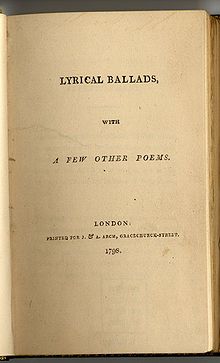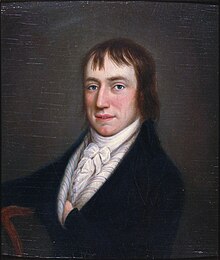1798 in literature
Appearance
| |||
|---|---|---|---|
| +... |
This article contains information about the literary events and publications of 1798.
Events
[edit]


- February – Samuel Taylor Coleridge writes the conversation poem "Frost at Midnight", commonly seen as the best of the series.
- April – Coleridge writes the conversation poems "Fears in Solitude" ("Written ... During the Alarm of an Invasion", soon published in a pamphlet) and "The Nightingale".
- April 16 – Coleridge's "The Recantation: An Ode" appears in The Morning Post, describing his disillusionment with the French Revolution.
- April 30 – Richard Cumberland's comedy The Eccentric Lover is first performed at the Covent Garden Theatre in London.
- September 18 – Lyrical Ballads, with a Few Other Poems by William Wordsworth and Samuel Taylor Coleridge is first published anonymously in Bristol by Joseph Cottle (who also remains anonymous), marking the beginning of English literary Romanticism.[1] Most of the poems are by Wordsworth, including Lines composed a few miles above Tintern Abbey on revisiting the banks of the Wye during a tour, 13 July 1798, but also opening with the first publication of Coleridge's The Rime of the Ancyent Marinere, whose first London publication is on October 4.
- October 11 – Elizabeth Inchbald's Lovers' Vows (adapted from Kotzebue's Das Kind der Liebe – the child of love) is first performed at the Theatre Royal, Drury Lane, London.
- October 12 – The rebuilt Weimarer Hoftheater are inaugurated with the first performance of the first part of Friedrich Schiller's dramatic trilogy Wallenstein: Das Lager (The Camp), directed by Goethe.
- unknown dates
- Ivan Kotliarevsky's mock-heroic poem Eneyida (Енеїда) becomes the first printed work in the modern Ukrainian language.[2]
- The National Library of the Netherlands originates when the Batavian Republic opens the former library of the stadtholder to the public.[3]
- The Académie française publishes the 5th edition of its Dictionnaire.[4]
- Thomas Nelson's publishing company is established in Edinburgh as a second-hand religious bookshop.[5]
New books
[edit]Fiction
[edit]- Charles Brockden Brown
- Alcuin: a Dialogue
- Wieland: or, The Transformation; an American Tale
- Emily Clark – Ianthé, or the Flower of Caernarvon
- Francis Lathom – The Midnight Bell: a German story, founded on incidents in real life
- Regina Maria Roche – Clermont: a Tale[6]
- Eleanor Sleath – The Orphan of the Rhine: a romance
- Caroline von Wolzogen (anonymously) – Agnes von Lilien (first complete book publication, in 2 vols)
- Mary Wollstonecraft – Posthumous Works (edited by William Godwin) including Maria: or, The Wrongs of Woman
Children
[edit]- François Guillaume Ducray-Duminil – Cœlina, ou l'Enfant du mystère (Celina, or the Mystery Child)[7]
- Edward Augustus Kendall
- Keeper's Travels in Search of His Master
- The Sparrow. A Tale
- Richmal Mangnall (anonymously) – Historical and Miscellaneous Questions for the Use of Young People (often known as Mangnall's Questions)
- Samuel Jackson Pratt – Pity's Gift: a collection of interesting tales, to excite the compassion of youth for the animal creation (Selected by a Lady)
Drama
[edit]- James Boaden
- Elizabeth Craven – The Georgian Princess
- Richard Cumberland –
- Thomas John Dibdin – The Mouth of the Nile
- Thomas Holcroft –
- Elizabeth Inchbald – Lovers' Vows
- Thomas Morton
- Frederick Reynolds – Laugh When You Can
- Friedrich von Schiller – Wallensteins Lager
Poetry
[edit]- Samuel Taylor Coleridge and William Wordsworth – Lyrical Ballads
- Richard Polwhele (anonymously) – The Unsex'd Females
- The Rime of the Ancient Mariner
Non-fiction
[edit]- Nathan Drake – Literary Hours
- Hannah Webster Foster – The Boarding School; or, Lessons of a Preceptress to Her Pupils
- William Godwin – Memoirs of the Author of A Vindication of the Rights of Woman
- Edward Jenner – An Inquiry Into the Causes and Effects of the Variolæ Vaccinæ
- Thomas Malthus (anonymously) – An Essay on the Principle of Population
- Richmal Mangnall – Historical and Miscellaneous Questions for the Use of Young People[1]
Births
[edit]- January 5 – David Macbeth Moir, Scottish poet and humorist (died 1851)
- January 29 – Henry Neele, English poet and scholar (died 1828)
- February 12 – Catherine Gore, English novelist and dramatist (died 1861)
- February 17 – Auguste Comte, French philosopher (died 1857)
- March 30 – Luise Hensel, German religious author and poet (died 1876)
- June 29 – Count Giacomo Leopardi, Italian poet, essayist and philologist (died 1837)
Deaths
[edit]- April 12 – Madeleine de Puisieux, French philosopher and feminist writer (born 1720)
- June 4 – Giacomo Casanova, Italian librarian and memoirist (born 1725)
- June 20 – Jeremy Belknap, American historian of New Hampshire (born 1744)
- December 16 – Thomas Pennant, Welsh naturalist and travel writer (born 1726)[8]
References
[edit]- ^ a b Everett, Jason M. (2006). "1798". The People's Chronology. Thomson Gale.
- ^ Orest Subtelny (1 January 2000). Ukraine: A History. University of Toronto Press. p. 230. ISBN 978-0-8020-8390-6.
- ^ "History of the KB". Koninklijke Bibliotheek. 1994. Archived from the original on 2013-12-16. Retrieved 2013-12-11.
- ^ Dictionnaire de l'Académie française, 5th edition, 1798. University of Chicago ARTFL Project. 1998.
- ^ Bamber Gascoigne; Thomas Nelson & Sons (19 June 1997). Milestones in Colour Printing 1457-1859: With a Bibliography of Nelson Prints. Cambridge University Press. pp. 54–. ISBN 978-0-521-55441-1.
- ^ Leavis, Q. D. (1965). Fiction and the Reading Public (Rev. ed.). London: Chatto & Windus.
- ^ Timothy Unwin; Unwin Timothy (28 October 1997). The Cambridge Companion to the French Novel: From 1800 to the Present. Cambridge University Press. p. 76. ISBN 978-0-521-49914-9.
- ^ Samuel Johnson (1841). Johnson's Dictionary of the English language, containing many additional words; also, A compendium of chronology [&c.]. p. 253.
